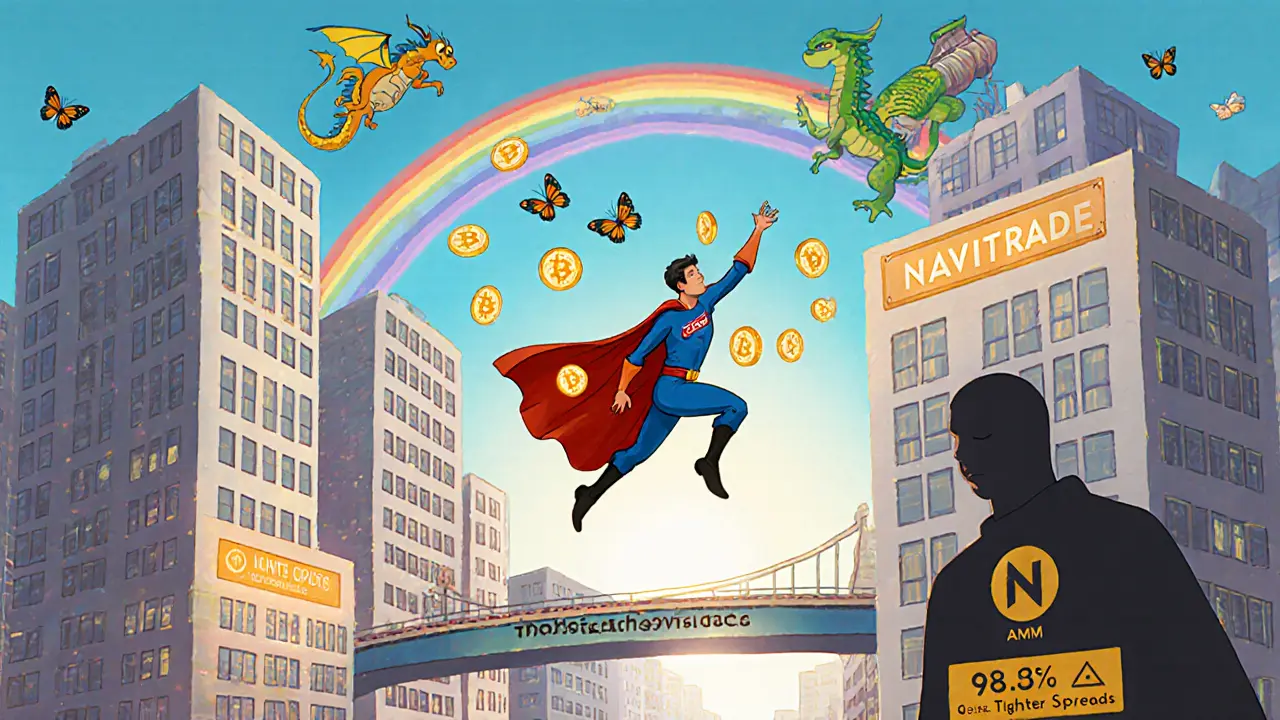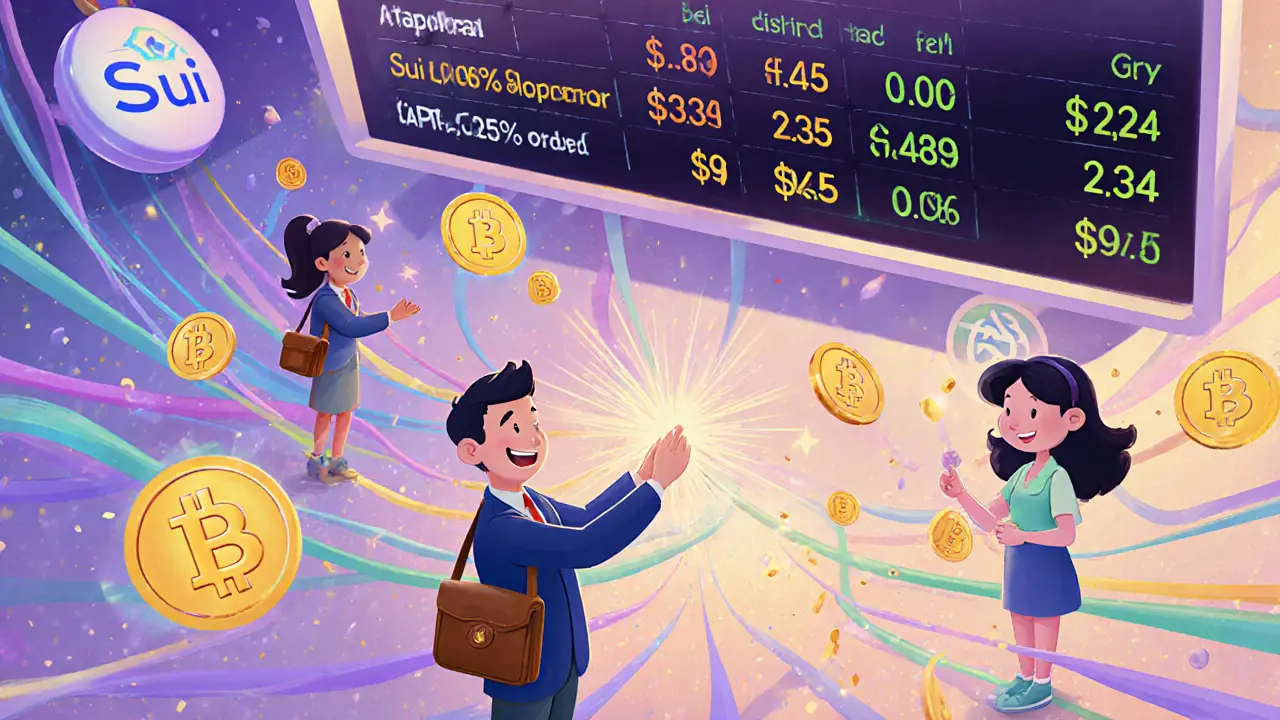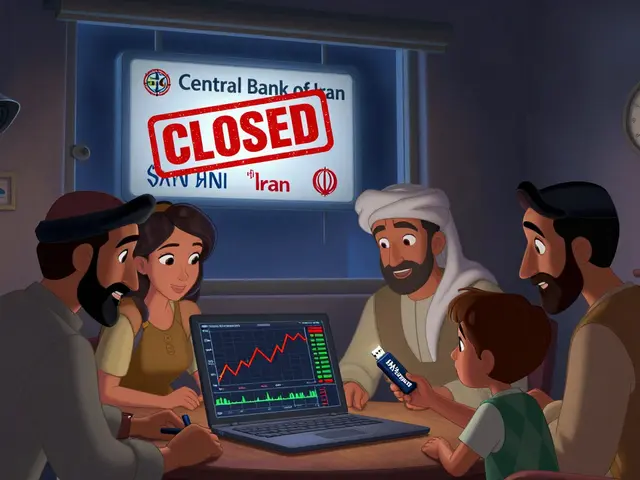DeepBook Slippage Calculator
Estimate Your Trading Costs
Compare slippage between DeepBook Protocol (on-chain order book) and AMM-based DEXs like Uniswap. Input your trade amount to see the difference in execution costs.
Enter trade details to see your slippage comparison
Most decentralized exchanges run on automated market makers (AMMs) like Uniswap - where prices shift based on pool ratios, not real buyer and seller orders. If you’ve ever placed a limit order on a DEX and watched it slip 5% because the pool was shallow, you know the frustration. DeepBook Protocol changes that. It’s not another AMM. It’s the first fully on-chain central limit order book (CLOB) built natively for the Sui blockchain, delivering exchange-grade trading with decentralized control.
How DeepBook Works - No Compromises
DeepBook doesn’t rely on liquidity pools. Instead, it uses real buy and sell orders stored directly on the Sui blockchain as objects. Every bid and ask is visible, matched, and settled on-chain. This means you can place a limit order at $0.2345 and know it will only execute at that exact price - no slippage, no surprises. The matching engine runs on Sui’s parallel execution architecture, allowing it to process over 10,000 transactions per second. Compare that to Ethereum-based DEXs, which struggle to hit 45 TPS. DeepBook’s average transaction fee? Around $0.01. On Ethereum, you’d pay $2-$5 during normal congestion.
It’s not just fast - it’s precise. In volatile markets, AMMs often have bid-ask spreads over 6%. DeepBook’s average spread is 0.08%. For trades under $10,000, slippage drops to near zero. That’s not marketing. That’s data from CoinPedia’s October 2025 report. This matters if you’re swing trading, scalping, or managing institutional-sized positions without trusting a centralized exchange.
Who Built It - And Why It Matters
DeepBook wasn’t created by a random DeFi team. It was built by Mysten Labs, the same group behind the Sui blockchain. That’s a big deal. It means DeepBook isn’t a bolt-on add-on - it’s a core component of Sui’s infrastructure. The protocol was launched in early 2024 and has since become the backbone for multiple trading interfaces like Turbos.exchange and Navitrade. These aren’t separate DEXs. They’re front-ends that all tap into the same DeepBook order book. That means liquidity isn’t fragmented. A buy order on Turbos is visible to a seller on Navitrade. That’s composable liquidity - something no other on-chain order book has achieved at this scale.
The DEEP token powers the protocol. As of November 10, 2025, it trades at $0.06703 with a market cap of $286.8 million and a circulating supply of over 4.3 billion tokens. It’s not just a governance token - it’s used for fee discounts and staking rewards on integrated platforms. The token’s price has been volatile, dipping 7.8% in late October, but daily active users rose 19% month-over-month to 48,700. That’s a sign of real usage, not just speculation.
How It Compares to the Competition
On Solana, Serum offered a similar idea - an on-chain order book. But it had high failure rates during congestion. DeepBook’s parallel execution model reduces order failures by 42% compared to Serum, according to FlitPay’s August 2025 analysis. Against Uniswap V3, DeepBook is 98.7% tighter on spreads and 99.9% lower on slippage. But here’s the catch: DeepBook only works with Sui-native assets. Only 12.7% of its liquidity comes from bridged tokens like USDC or ETH. If you want to trade Bitcoin or Solana tokens, you need to bridge them first - and that adds steps and risk.
THORChain and other cross-chain protocols support more assets, but they’re slower and less precise. DeepBook trades like a centralized exchange - but without the custody risk. That’s why institutional traders like GSR and Wintermute started using it in September 2025. They need speed, precision, and transparency. DeepBook gives them that - without leaving the blockchain.

What Users Are Saying
Reddit user SuiTrader88 summed it up: ‘DeepBook’s order book finally gives me the precision I need for swing trading - filled my limit order at exactly $0.2345 when price barely touched it.’ That’s the kind of feedback that matters. But not everyone finds it easy. New users on Sui’s Discord complained about orders sitting unfilled for hours because they didn’t understand time-in-force settings like GTC (Good ‘Til Canceled) or IOC (Immediate or Cancel). The learning curve is real.
Trustpilot reviews for DeepBook-powered platforms average 3.8/5. Positive reviews highlight low fees and tight spreads. Negative ones point to limited token pairs and confusing order types. A CoinGecko survey found 68.3% of professional traders prefer DeepBook for active trading. But 79.1% of casual users still stick with AMMs because they’re simpler. This isn’t a replacement for Uniswap - it’s a tool for traders who want more control.
How to Start Trading on DeepBook
You can’t trade DeepBook directly from your MetaMask wallet. You need to be on Sui. Here’s how:
- Get a Sui-compatible wallet like Sui Wallet or Ethos.
- Bridge your assets (like USDC) to Sui using Celer Network or the official Sui bridge.
- Go to a DeepBook front-end - Turbos.exchange or Navitrade are the most popular.
- Connect your wallet and start placing orders.
First-time users typically need 5-8 hours to get comfortable. Experienced DeFi traders can pick it up in 1-2 hours. The official documentation is solid (rated 4.1/5 on GitHub), but it assumes you already know what a limit order is. If you’re coming from AMMs, check out the GitHub guide ‘DeepBook for AMM Users’ - it has over 2,800 stars and walks you through the differences.

What’s Next for DeepBook
The roadmap is ambitious. In Q4 2025, DeepBook will launch institutional-grade API endpoints - meaning bots and algos can connect directly. In Q1 2026, cross-chain order books are coming. That’s huge. It could finally solve the liquidity fragmentation problem. Options trading is planned for Q2 2026. If they deliver, DeepBook could become the DeFi equivalent of Bloomberg Terminal - a professional-grade trading platform on-chain.
Right now, DeepBook handles 38% of all DEX volume on Sui - $22.66 million daily. It holds 89% of the Sui order book market share. The only real competition is OrderBookSui, which has just 7%. That’s dominance. But it’s also risk. If Sui’s ecosystem slows down, DeepBook slows down too. Over 97% of its value is tied to Sui’s success.
Is DeepBook Right for You?
If you’re a casual trader who just wants to swap ETH for a new meme coin, stick with Uniswap or SushiSwap. It’s easier. But if you’re serious about trading - if you care about price control, low fees, and on-chain transparency - DeepBook is the only DEX that delivers. It’s not perfect. The token list is limited. The interface isn’t beginner-friendly. But it’s the only decentralized exchange that truly mimics the experience of Binance or Coinbase Pro - without the middleman.
DeepBook isn’t the future of DeFi. It’s the present. And it’s the first time order book trading has worked at scale on a public blockchain. If you’re looking for a real alternative to centralized exchanges, this is it.
Is DeepBook Protocol a centralized exchange?
No. DeepBook is a decentralized protocol that runs entirely on the Sui blockchain. All orders, matching, and settlements happen on-chain. You retain full control of your funds in your own wallet. There’s no central authority holding your assets or managing trades.
Can I trade Bitcoin or Ethereum on DeepBook?
Not directly. DeepBook only supports Sui-native tokens. To trade Bitcoin or Ethereum, you must first bridge them to Sui using a bridge like Celer Network. Once bridged, they become wrapped assets (like wBTC or wETH) on Sui and can be traded on DeepBook. Only about 12.7% of DeepBook’s liquidity comes from bridged assets, so liquidity for these pairs is lower than for native tokens.
What’s the difference between DeepBook and Uniswap?
Uniswap uses automated market makers (AMMs), where prices are set by liquidity pools. This leads to slippage and wide spreads, especially in volatile markets. DeepBook uses a central limit order book, where buyers and sellers set exact prices. This means tighter spreads, near-zero slippage for small trades, and full price control. DeepBook is better for active traders; Uniswap is easier for simple swaps.
How much does it cost to trade on DeepBook?
Trading fees on DeepBook average $0.005 to $0.015 per transaction. This is 100x cheaper than Ethereum-based DEXs during normal congestion. The low cost comes from Sui’s parallel execution model, which eliminates the network congestion and high gas fees common on other blockchains.
Is DeepBook safe to use?
Yes, as long as you follow best practices. DeepBook’s code is open-source and audited. Since it’s on-chain, all trades are transparent and immutable. Your funds stay in your wallet - never held by DeepBook. The main risk is user error: placing the wrong order type, misunderstanding time-in-force settings, or using an untrusted front-end. Always use official interfaces like Turbos.exchange or Navitrade.
What wallets work with DeepBook?
DeepBook works with any Sui-compatible wallet. The most popular are Sui Wallet (official), Ethos, and Ledger (via Sui integration). You cannot use MetaMask or Trust Wallet - they don’t support Sui. Make sure your wallet supports the Move programming language and Sui’s object model.
Where can I buy the DEEP token?
DEEP is available on several Sui-based DEXs, including Turbos.exchange, Navitrade, and Cetus Protocol. You can also find it on centralized exchanges that list Sui-native tokens, like Bybit and KuCoin. As of November 10, 2025, the price is around $0.06703 with a market cap of $286.8 million.






Kevin Mann
Okay so I just spent 4 hours trying to place a limit order on Turbos.exchange and I swear to god I thought my wallet was hacked. The UI is like a hacker’s dream - all dark mode and cryptic buttons. I clicked ‘GTC’ thinking it meant ‘Get To Cash’ and my order sat there for 3 hours like a ghost. Then I read the docs and realized it meant ‘Good ‘Til Canceled’ - which sounds like something your grandpa says when he forgets his keys. I’m not mad, I’m just… emotionally exhausted. 😩
Cydney Proctor
Of course it’s ‘exchange-grade’ - when you’re running on a blockchain that’s basically a glorified spreadsheet with better marketing. DeepBook isn’t innovation, it’s just AMMs with a fancy label and a $0.01 fee so you feel like you’re getting a deal. The real innovation? Convincing people that slippage is the enemy and not the fact that you’re trading tokens with no intrinsic value. The DEEP token’s market cap? A funhouse mirror of speculative delusion. I’d rather hold cash.
Vipul dhingra
you people are so obsessed with order books like its some holy grail but you forget that 90 of the trades on deepbook are bots and wash trading and the real users are just losing money to front running the whole thing is a casino with better ui and you think its decentralized but its just ssi in disguise
Wendy Pickard
I appreciate the depth of this breakdown. Honestly, I’ve been hesitant to jump into Sui because I didn’t understand the difference between AMMs and order books - this made it click. I’ve been using Uniswap for years and never realized how much I was losing on slippage. I’m going to try DeepBook this weekend with a tiny amount just to test it. No pressure, no expectations. Just learning.
Vivian Efthimiopoulou
What DeepBook represents isn’t merely a technical upgrade - it is a philosophical reorientation of value in decentralized finance. Where AMMs commodify liquidity into static pools, DeepBook resurrects the classical market mechanism: price discovery through human intention. Each bid and ask is a silent negotiation, a digital handshake across time and space. The Sui blockchain, with its parallel execution, becomes not just a ledger, but a cathedral of economic sovereignty. The fee structure? A whisper of liberation from the gas tax tyranny of Ethereum. This isn’t trading - it’s reclamation. And yet, we remain tethered to the myth of accessibility, as if the user experience should be diluted to accommodate the uninitiated. True progress is not in simplification - but in elevation.
Jeana Albert
So let me get this straight - you’re telling me that after all these years of DeFi being ‘decentralized and open,’ we finally get something that actually works like a real exchange… and the only people who can use it are the ones who’ve spent 8 hours reading GitHub docs? And you call that progress? I’m supposed to be excited that my $10 trade costs a penny but I have to become a blockchain engineer to do it? This isn’t innovation - it’s elitism wrapped in whitepaper jargon. Who even designed this? A VC who thinks ‘user-friendly’ means ‘has a button’?
Pranjali Dattatraya Upadhye
Okay I tried DeepBook last night after reading this and I’m not gonna lie - I was skeptical. But I placed a $50 limit order at $0.2345 and it filled exactly at that price - no drama, no surprise slippage. I felt like a real trader for the first time. I didn’t even know what GTC meant until I read the docs (thanks for the tip!) and now I’m hooked. The UI still feels like a hacker’s sketchbook but once you get past the learning curve? It’s magic. Also, the DEEP token staking rewards on Navitrade are actually decent. Not life-changing, but nice. Sui is quietly becoming the quiet genius of DeFi.
Matthew Gonzalez
DeepBook is the first DEX that doesn’t feel like a scam. Not because it’s perfect - it’s not. But because it’s honest. AMMs pretend they’re fair, but they’re just price generators for whales. DeepBook says: here’s the order book, you set the price, you take the risk. No illusions. That’s radical. And yeah, it’s not for beginners. But maybe that’s okay. Maybe DeFi shouldn’t be for everyone. Maybe the people who want to trade should have to learn how to trade. That’s not elitism - that’s responsibility.
Missy Simpson
I’m so proud of how far DeFi has come!! 💪 DeepBook is like the superhero we didn’t know we needed - fast, cheap, and actually fair. I’ve been using it for 2 weeks now and my trades feel so much more intentional. I used to hate watching my limit orders get eaten by slippage… now I feel like a pro! The only thing I wish was easier was the bridge setup - took me 3 tries but now I’m a Sui pro! Keep going, DeepBook team!! 🙌✨
Diana Smarandache
While the technical specifications are undeniably impressive, one must question the sociological implications of a protocol that necessitates a graduate-level understanding of blockchain mechanics to execute a simple trade. The claim of ‘decentralized control’ rings hollow when access is gated by cognitive and educational barriers. The market cap figures cited are meaningless without context of token distribution. A 4.3 billion circulating supply with a $0.067 price implies an extreme dilution - and yet, institutional adoption is cited as validation. This is not innovation. It is monetized complexity.
Angie Martin-Schwarze
so i tried deepbook and like… my order just sat there for 5 hours and i thought it was broken but then i checked the docs and realized i forgot to set the time in force?? like i just wanted to buy 10 bucks of a coin not write a thesis on blockchain order types?? why is this so hard?? also i think i typoed my wallet address once and now i’m scared to trade again 😭
Cierra Ivery
Wait - so you’re telling me this ‘revolutionary’ order book only supports Sui-native assets? And you think that’s a feature? Not a flaw? You’re building a luxury sports car… and then refusing to let people put gas in it. You’re not solving liquidity fragmentation - you’re creating a walled garden with a sign that says ‘Only the enlightened may enter.’ And you’re calling that decentralization? You’re not building the future - you’re building a cult. And DEEP token holders are the acolytes.
andrew seeby
bro i just wanna buy a meme coin and chill 😅 i tried deepbook once and my brain hurt. like i got the whole ‘limit order’ thing but why does it feel like i’m coding a smart contract just to buy $5 of DOGE? i miss uniswap. at least there i could just click ‘swap’ and forget about it. deepbook is for people who like spreadsheets and coffee and pretending they’re on wall street. i’m just here for the memes. 🐶💰
Stephanie Tolson
I want to say something kind here - because I think DeepBook matters. Not because it’s perfect, but because it proves that decentralized markets can be precise, fast, and fair. That’s not a small thing. It means someone, somewhere, can trade without begging a centralized exchange for permission. The learning curve? Real. But so was riding a bike the first time. We don’t stop teaching kids to ride because they fall. We hand them a helmet and say, ‘Try again.’ This isn’t just about trading - it’s about building a financial system that doesn’t depend on trust. That’s worth the effort. Keep going, DeepBook. We’re watching.
Tara R
Let’s be honest - this is just a rebranding of centralized exchange mechanics on a blockchain with lower fees. The term ‘on-chain order book’ sounds impressive until you realize it’s just a glorified ticker feed with more latency than a dial-up modem. The institutional adoption claims are vague. GSR and Wintermute? They use centralized exchanges for 90% of their volume. This is vaporware dressed in whitepaper. And the tokenomics? A giveaway to early investors. I’ll pass.
Kevin Mann
Wait - so I just read that DeepBook’s spread is 0.08%? That’s insane. I just checked my last trade on Uniswap - 3.2% slippage on a $200 swap. I thought I was being careful. Turns out I was just being naive. I’m going back to DeepBook tomorrow with a bigger position. And I’m reading the ‘DeepBook for AMM Users’ guide. Again. This time with coffee.